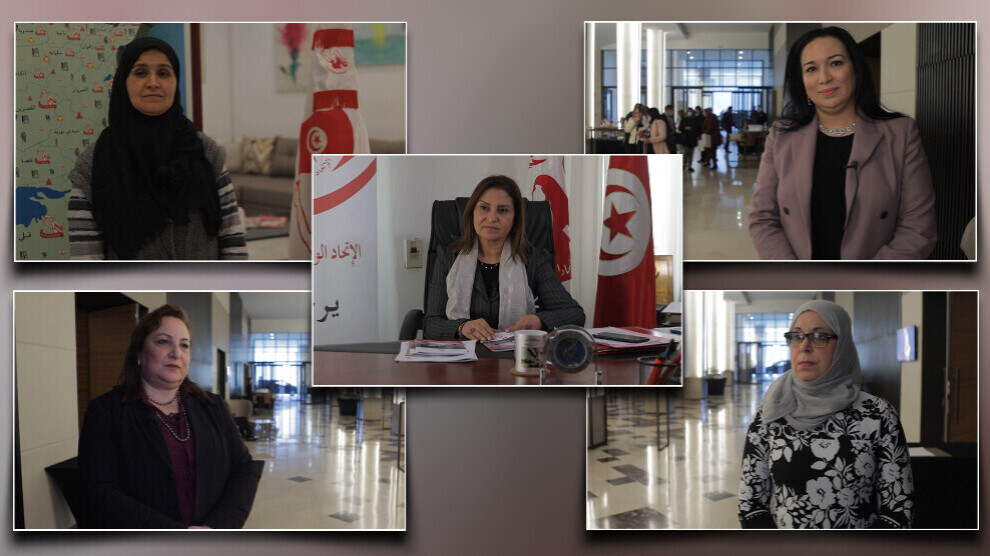Tunisian women face violence at work
Women organizations and associations continue to receive complaints of gender-based workplace violence in Tunisia every day.

NAZIHA BOUSSIDI
Tunisia- Tunisian women continue to be subjected to physical, psychological and economic violence, sexual harassment and discrimination in the workplace.
Anisa Hamza is a doctor working at the emergency department in Tataouine governorate. Speaking about violence against her at work, she said, “I was subjected to violence by Tarek Haddad, Spokesperson for the Coordination of the Sit-in in El-. Kamour, his brother and brother-in-law at work. Tarek Haddan and his brother came to the emergency department. I told him to go to the outpatient department since his condition was not an emergency condition. They refused and attacked me. I tried to film the assault but Tarek Haddan tried to pull the phone out of my hand, with the help of his brother. I tried to escape from them and return to my office but they followed me, so I turned to them and asked them what they asked from me. He tried to beat me so I entered a room, locked the door, and called the police. After half an hour, I thought that the situation had become calmer and went out to work. I saw a man and thought that he was a police officer but then I learned that he was Tarek Haddan’s brother-in-law. He shouted at me and claimed that I had pushed Tarek Haddan and his brother. Then, he threw a chair at my head. After throwing the chair, he went out saying, ‘She hit me’.”
They were sentenced to a year in prison
After the incident, Anisa Hamza filed a criminal complaint against Tarek Haddan and his brother-in-law. They were sentenced to a year in prison for using violence against Anisa Hamza.
86 women journalists were subjected to violence
Not only women working in the health sector, but also women working in the press are also subjected to gender-based violence at work. During the period from November 2020 to the end of October 2021, 105 attacks on female journalists were recorded, and 86 female journalists were subjected to repeated attacks on several occasions and in various forms, physically or verbally, sexual harassment and ban from work, according to the report released by the National Syndicate of Tunisian Journalists (SNJT).
70% of women lost their job
There are many causes behind gender-based violence at work. Women organizations and associations continue to receive complaints of gender-based workplace violence in Tunisia every day. Due to the increase in complaints of gender-based workplace violence by women, a survey was conducted in Kairouan Governorate to reveal the main causes behind gender-based violence at work. According to the survey, 79% of women were subjected to economic violence and exploitation at work, 70% of women lost their job and 61% of married women were subjected to sexual violence in 2021.
“You have obtained all the rights, what do you want more?”
Radhia Jerbi, the president of the National Union of Tunisian Women (UNFT), told NuJINHA that the union has conducted a study on gender-based violence at work. Underlining that the union receives complaints of gender-based workplace violence in Tunisia every day, she said, “Nurses working at night are subjected to harassment and violence. A woman working for a national press outlet was harassed by her employer and she applied to our union to file a complaint against her employer. Although I am the president of the union, I was also subjected to violence. Personally, I met a judge in his office and told him about the pressures and violence faced by women in the workplace. His answer surprised me. I was told, ‘You have obtained all the rights, what do you want more?’ We also receive complaints from women, who were subjected to violence from some security officers.”
“Percentage of women in decision-making positions does not exceed 3%”
Amel Samoud Khamari, President of the Tunisian Association of Governance and Equal Opportunities between Women and Men in Decision-Making Positions (ATGEC), told us that she was also subjected to violence while obtaining the membership in a board of directors. “Everyone worked to intimidate me, remove me from my position,” she said. Talking about the percentage of female graduates from universities, she said, “The percentage of female graduates from public universities has reached 70% while the women employment rate is only about 27%. The percentage of women in decision-making positions does not exceed 3%.”
“The exclusion of women from decision-making positions is one of the worst forms of violence faced by women at work,” said Suniya Hosseini, an official at the Ministry of Social Affairs and civil society activist.
New culture against violence
Minister of Women, Family and Elderly Affairs Amel Belhaj Moussa confirmed the existence of the dark side in violence against women at work. She said that they need to create a new culture to struggle against this phenomenon by breaking the silence against gender-based violence, empowering women’s participation in decision-making positions.
